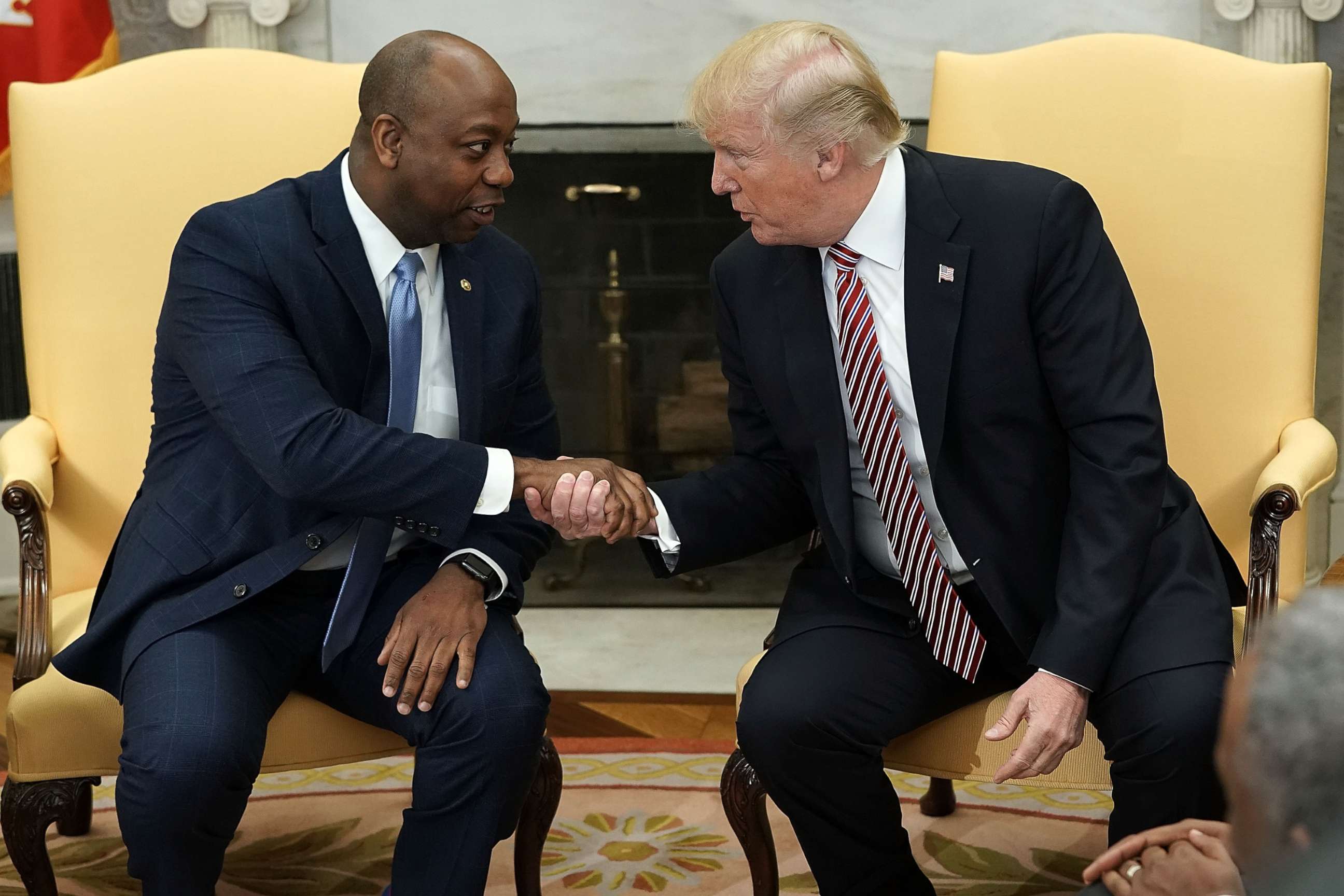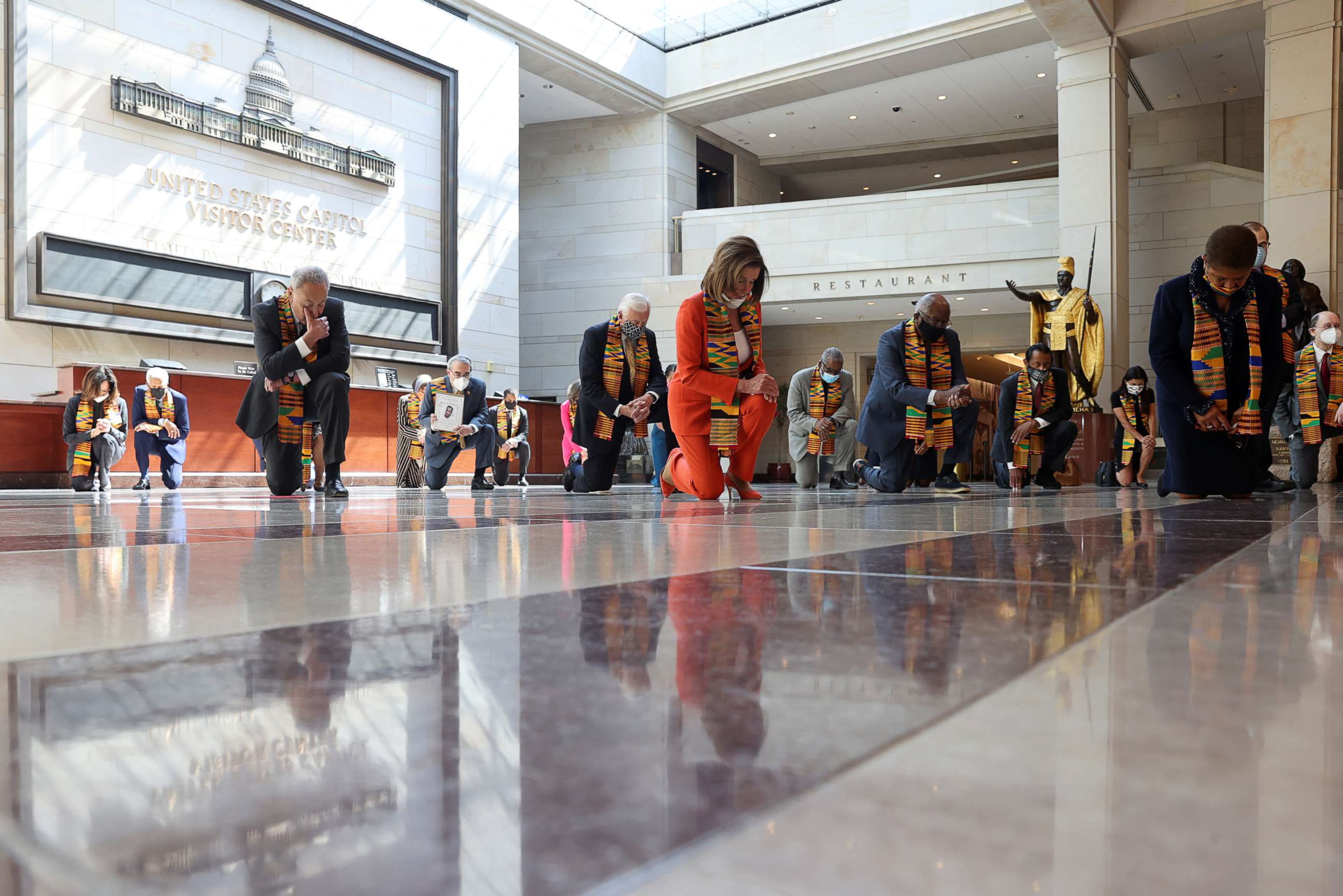GOP senators aim to propose policing reforms but conference is divided
Sen. Tim Scott leads a group that will propose a GOP policing reform bill.
In the wake of George Floyd's killing at the hands of police, nationwide charges of systemic racism in law enforcement and congressional Democrats introducing a sweeping reform bill, Republican senators in Washington are grappling with how to respond.
The Democrats' bill -- introduced Monday -- would ban choke-holds, create a national misconduct registry for cops, limit qualified immunity for police officers, make lynching a federal hate crime and restrict the transfer of military-grade equipment to police departments.
Many GOP senators appeared skeptical of broad federal mandates on police departments, which are run at the local level. Still, the momentum for change across the country has clearly been felt by lawmakers of every stripe, though Republicans also appeared painfully aware of how difficult a needle this will be to thread.
The chamber's only African American Republican, Sen. Tim Scott of South Carolina, is taking on that challenge, leading a group of six GOP senators who intend to unveil a bill by week's end.
Scott has been crafting a policing reform bill for weeks, spoken with the White House on multiple occasions and on Tuesday -- at the weekly GOP policy lunch -- laid out what his group hopes to do and listened to input from colleagues.
"I think we have an opportunity to see something happen, because I think time is of the essence," said Scott after the GOP lunch. "I think it's important for this nation to take a very powerful stand and position that says we're listening, we're hearing, and we're reacting. We're responding in a positive, constructive manner that doesn't create a binary choice between supporting law enforcement and supporting communities of color. I think you can actually do both. And we're going to make sure that that is at least one of the opportunities on the table."
The Republican proposal, according to Scott, is expected to include language making lynching a federal hate crime, a notification requirement for no-knock warrants which would collect the number of times these are used for future analysis, incentivize police departments to report use of force that causes serious harm or death, increase funding for body cameras with penalties for failure to use them and deescalation and bias training.
"I have been talking with folks in the White House about the track that they're on as well," Scott said, noting that the administration is working on a different proposal and adding that there is a chance that the two proposals might ultimately be merged with what Democrats have pitched, a prospect that appeared highly ambitious in the current environment.

"I think there is some synergy between all three tracks to be honest with you, and certainly there's a way for us all to work together, but we've been in discussion with them for several days," said Scott, who met Tuesday evening for a half hour with White House chief of staff Mark Meadows, the president's son-in-law and senior adviser Jared Kushner, and Ja'Ron Smith, deputy assistant to the president and most senior African American in the West Wing.
The Senate GOP working group includes Judiciary Committee Chairman Lindsey Graham, as well as, Ben Sasse of Nebraska, Oklahoma's James Lankford, John Cornyn of Texas -- who is a close ally of Majority Leader Mitch McConnell -- and West Virginia's Shelley Capito.
Graham, R-S.C., has scheduled a hearing next week on policing reform, telling reporters that he has told his members to "think big" in terms of witnesses.
The ideological tug-of-war between wanting to enact change now -- particularly in the face of a national uproar against police abuses -- and staying true to a bedrock GOP philosophy of a smaller federal government footprint and respect for state and local rights was apparent among Republicans on Tuesday.
McConnell, R-Ky., did not commit to putting a proposal on the Senate floor, telling reporters Tuesday, "I've asked Sen. Tim Scott to lead a group that is working on a proposal to allow us to respond to the obvious racial discrimination that we've seen on full display on our television screens over the last two weeks and what is the appropriate response by the federal government."
The majority leader added, "We'll all have more to say about that in the future."
Still, Republicans remained divided on many issues surrounding policing reform, from a federal ban on choke-holds to stripping officers of legal immunity in use-of-force situations.
Sen. Mike Braun, R-Ind., an ally of President Donald Trump, said emphatically that he supports such a ban.
"I think those ought to be gone. Period," Braun told reporters, though he insisted that Congress needs to be "a little careful" when it comes to federal mandates, adding, "To me, it's more effective when it comes from the grassroots up."
Scott said that he did not see a need to include such a ban in his legislation; rather, effective training is the answer.
"We certainly think that there are ways to provide resources for training from a deescalation perspective that would perhaps eliminate the use of choke-holds. I think the House's approach has been to eliminate it altogether," Scott said.
"Once again, I think while I might support the elimination of all choke-holds, I think the way to get there is to provide more training and more resources so that local jurisdiction has the ability to make that decision themselves," he added. "And from my understanding, that's the wave of the future and it's happening now and, frankly, by the time we get this legislation up I think we'll have fewer options, fewer opportunities to ban it because I think it'll be gone."
But Capito, R-W.Va., a member of the Scott group, did not rule out adding such a prohibition, saying it's not in the proposal now "but we're still working."
Trump has not indicated where he stands on choke-holds, but his attorney general said in an interview Monday that he supports a ban though it was not clear if that meant doing so on a federal level.
"I think we should ban chokeholds, lateral chokeholds," Attorney General Bill Barr told Fox News' Brett Baier, "unless police officers are confronted with potentially lethal force."

And though Democrats have called for an end to the legal doctrine -- created by the courts -- known as "qualified immunity," which shields government officials, including police officers, from civil lawsuits as long as "clearly established law" is not violated, only a handful of Republicans have expressed support.
"So I'm actually thinking seriously about the qualified immunity," Braun told reporters. "Most in our conference don't want to go that far, but I think that'd be the one thing that we show them -- that in our conference, we mean business. You never know, this might be a watershed moment."
Sen. Rand Paul, R-Ky., who has joined Democrats on numerous criminal justice reform bills but is currently the lone senator holding up anti-lynching legislation, said he is looking at the immunity issue.
"We're studying that and seeing if there's something we can come up that we're for," Paul said. "It's my understanding -- it's not really a legislative thing -- it's a judicial precedent. We're going to have to see if Congress can try to overturn judicial precedent."
But Scott was less supportive.
"We haven't socialized that issue. I mean I certainly think it's an interesting issue and it depends on how you look at the issue. I know the House has it in their legislation. I would not include it in my legislation, but that's an issue you'd have to ask each individual member," said Scott.
And the Senate's number two Republican -- John Thune -- indicated that the issue was not on the GOP agenda.
"That is, that's a tough issue," Thune told reporters before walking away.
Scott and Sen. Mitt Romney, R-Utah, who marched with protesters over the weekend and expressed interest in policing reform, are beginning to talk to their Democratic colleagues, but it remains unclear if Republicans and Democrats can come together amid the heated rhetoric and passions of the moment -- particularly in a pivotal election year with the Senate's majority at stake and a bitterly partisan presidential election underway.
Paul blamed Democrats for the current problems in policing.
"You know, the finger needs to be pointed where it needs to be pointed, and that's cities run by Democrats for 50 years. Police chiefs, all Democrats, all these people from the Democrat Party, they need to do a better job in their cities. I've been advocating for this, I spoke out when Ferguson happened. I spoke out when Eric Garner happened," said Paul, referencing other instances where black men were killed by police.
Some Republicans dug in and insisted that any legislation that implied criticism of police was a nonstarter.
"Anything that would reflect and impose on the law enforcement officers in America that they're not doing their job or they're somehow -- it's all negative as the Democrats are trying to declare -- is wrong, and I would oppose anything that they propose," said Sen. Jim Inhofe, R-Okla.
But Scott expressed hope for action soon, despite the deep divide in his conference.
"I'm very optimistic that it will get to the finish line," said Scott.
And Sen. Thune appeared to agree, telling reporters, "When you get away from the edges, I think there's a lot of common ground on legislation, things that we can do to respond in the near term and then obviously continue the discussion about some of the more structural changes that might be more long term."




